Come ogni anno, la Festa dei Ceri di Gubbio animerà la città nella giornata del 15 Maggio, che in questo 2019 cade di mercoledì.
La manifestazione affonda le sue radici in un passato lontanissimo, tanto da essere considerata una delle più antiche manifestazioni folcloristiche in assoluto dell’Umbria e d’Italia. Le Festa coinvolge infatti tutta la popolazione di Gubbio e richiama ogni anno centinaio di visitatori e curiosi.
A rimarcarne importanza e popolarità, dal 1973 l’immagine di Tre Ceri stilizzati è stata assunta come simbolo della stessa Regione Umbria.
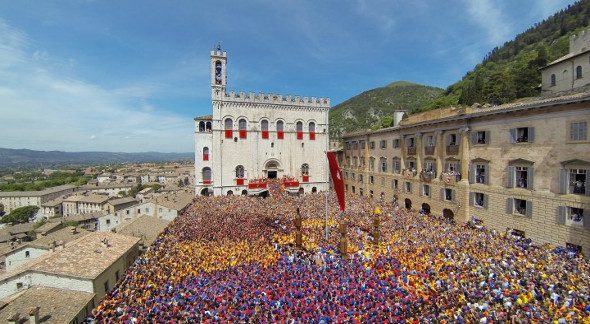
>> Approfitta della Festa dei Ceri per visitare Gubbio: potrai partecipare ad una manifestazione unica ed emozionante e soggiornare in uno dei borghi più belli dell’Umbria! Scopri ora tutti gli agriturismi di Gubbio!
I Ceri, protagonisti della Festa
Nell’ipotesi più accreditata, la Festa è legata alle celebrazioni religiose in onore del Vescovo Ubaldo Baldassini, Santo Patrono di Gubbio, risalenti alla sua morte nel 1160 e riproposti ogni anno nella giornata appunto del 15 maggio. Un’altra ipotesi piuttosto diffusa ricollega l’evento all’antichissima festa pagana precristiana in onore della dea delle messi Cerere (da cui forse il nome “ceri”), legata al risveglio della primavera.
Ciò che rende unica la Festa dei Ceri di Gubbio sono appunto i Ceri: i tre manufatti di legno sono sistemati su barelle che permettono il loro trasporto, e si caratterizzano per le loro decorazioni e soprattutto per le loro dimensioni. I Ceri presentano motivi ornamentali del tutto particolari e sono coronati da statue del Santo Patrono di Gubbio Sant’Ubaldo, San Giorgio e Sant’Antonio Abate, anch’esse di legno.
Con un’altezza che sfiora i 5 metri, e un peso che arriva oltre i 300 kg circa, assistere alla vista dei ceri che svettano tra la folla, avanzando nelle vie e nelle piazze di Gubbio, è uno spettacolo assolutamente unico.
Nella prima domenica di maggio, dopo la celebrazione religiosa mattutina, i Tre Ceri attraversano la città per la prima volta e vengono trasportati dalla Basilica di Sant’Ubaldo alla Sala Maggiore del Palazzo dei Consoli, dove resteranno esposti fino al fatidico 15 maggio.
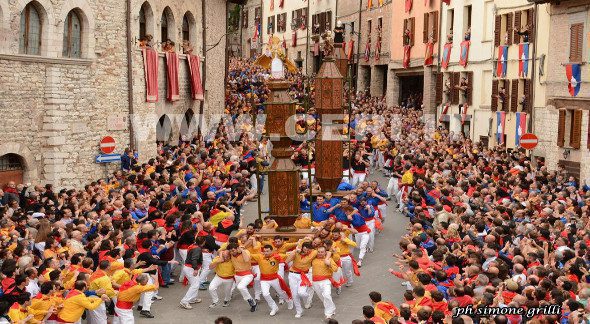
L’Alzata dei Ceri
Il 15 maggio a Gubbio prende il via con i tamburi che all’alba svegliano tutta la città, al ritmo della cosiddetta “Marcia dei Ceri”. Si prosegue poi con una serie di eventi e rievocazioni, che culminano in chiusura di giornata con l’Alzata dei Ceri in piazza e la Corsa.
L’Alzata dei Ceri rappresenta uno dei momenti più intensi della Festa. Si svolge in Piazza Grande, luogo che per l’occasione è gremito di una folla immensa e variopinta, perché vestita con i colori dei Tre Santi onorati dai ceri. Una volta entrati in piazza, facendosi largo tra la folla, i ceri trasportati dai ceraioli vengono “montati” ed issati in verticale.
L’operazione è particolarmente delicata: i ceri vengono fissati alle rispettive barelle, si fissano le statue dei Santi alle loro sommità e al suono del Campanone i “Capodieci“, saliti sulle stanghe del proprio cero, si spingono in avanti e alzano rapidamente i Ceri in verticale, per poi partire immediatamente.
I Ceri vengono a questo punto trasportati tra le vie della città, ognuno con un suo proprio percorso e ognuno fermandosi davanti alle abitazioni delle rispettive antiche famiglie ceraiole.
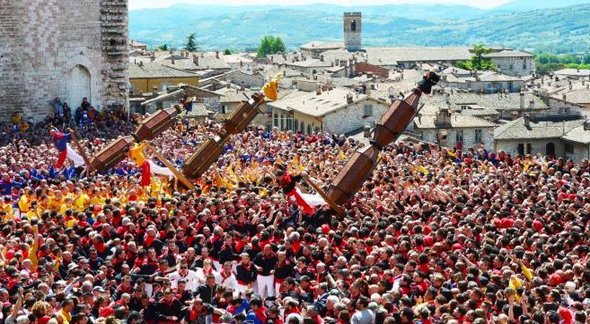
La Corsa dei Ceri
La giornata si conclude quindi con La Corsa dei Ceri, che costituisce un momento topico e assolutamente particolare.
Oltre ad essere una prova di forza, dato il peso dei ceri, la corsa è soprattutto una prova di grande abilità per i ceraioli. I ceri tendono infatti ad oscillare fortemente ed è importante correre e tenerli allo stesso tempo il più possibile in verticale. Soprattutto nella prima parte della corsa, che attraversa le vie cittadine, occorre essere attenti a far sì che i ceri non sfiorino mura o finestre.
L’ultima parte della corsa prevede infine la salita del Monte Igino, che sovrasta Gubbio, lungo le strade sterrate che conducono alla Basilica di Sant’Ubaldo. Qui lo sforzo fisico dei ceraioli raggiunge il suo massimo, con la strada in salita che raggiunge una pendenza media del 15% circa.
Una singolarità importante della Corsa dei Ceri di Gubbio è che non esiste sorpasso: i ceri corrono sempre nello stesso ordine, la “filosofia del ceraiolo” impone loro di correre alla massima velocità possibile cercando di non far cadere il proprio cero e di dare più distacco possibile agli altri nei tempi di percorrenza.
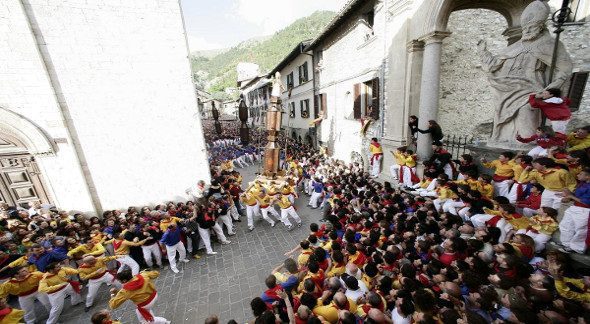
Vuoi saperne di più su questa storica e appassionante manifestazione ?! Visita la nostra pagina Festa dei Ceri e Corsa dei Ceri, troverai tante curiosità ed informazioni utili!
The “Ceri” Festival of Gubbio, as every year, will animate the city on 15th May, on Wednesday for this 2019.
The event rooted in a very far past and it is considerated one of the oldest typical manifestations of Umbria and Italy. The festival involves in fact the entire populations of Gubbio and it attracts hundreds of visitors and curious.
To mark his importance and popularity, in 1973 the Umbrian Region took the image of three stylized candles (“ceri”) as symbol of the region itself.

>> Participate to the “Ceri” Festival and visit Gubbio: live a unique and emotional event and stay in one of the most beautiful town of Umbria! Discover now all the farm houses of Gubbio!
The “Ceri”, true protagonists of the Festival
In the most accepted hypothesis, the festival is linked to the religious celebrations in honor of Bishop Ubaldo Baldassini, the Saint Patron of Gubbio, dating on his death in 1160 and represented every year in the precisely day of 15th May. Another hypothesis rather known liked the event to the ancient pre-Christian pagan festival in honor of the god Cerere (hence perhaps the name “ceri”) for the arrival of Spring.
The candles (“Ceri”) make unique this festival: they consist in three wooden artifacts, placed on three stretchers that allow their transport. They are also characterised by their decorations and especially by their size. The candles have very special decorative motifs and they have on the top the wooden statues of the patron saints of Gubbio, Saint Ubaldo, Saint George and Saint Abbot.
With a height of nearly 5 meters, and a weight that reaches beyond 300 kg, looking at the sight of the candles that stand out into the crowd, advancing in the streets and squares of Gubbio, it’s a unique spectacle.
On the first Sunday of May, after the religious celebration of the morning, the three “ceri” through the city for the first time and they are transported from the Cathedral of Saint Ubaldo to the Sala Maggiore of Consoli Palace. They will remain here, on display, until the fateful 15th May.

The Rising of “Ceri”
15th May in Gubbio starts with the roll of drums that at the sunrise wakes up the whole town, at the rhythm of the so-called “Ceri March”. The day continues with a series of events and reenactments, which culminate at the end of the day with the Rising of Candles in the main square and with the race.
The rising is one of the most intense moments of the festival. It takes place in Piazza Grande, a place that for this occasion is full of a immense and colorful crowd, dressed with the colors of the 3 Saints honored by the candles. Once in the square, making their way through the crowd, the candles carried by the “ceraioli” are “mounted” and hoisted vertically.
The operation is particularly delicate: the candles are fixed to the respective stretchers, they fix the statues of the Saints on their tops and, at the sound of the “Campanone”, the leader of each team (“Capodieci”) climbs the poles of its candle, pushes forward getting up quickly the candle vertically, and then leaves immediately.
At this point, the candles are carried on through the streets of the city, each one with its own path, stopping in front of the homes of their ancient “Ceraioli”‘s families.

The Race of “Ceri”
The day concludes with the Race of the Candles, definitely a very special moment.
In addition to being a test of strength, for the reason of the weight of the candles, the race is primarily a proof of great skill for “ceraioli”. The candles in fact tend to fluctuate and it is really important to run and keep them as vertical as possible at the same time. Especially in the first part of the race, that cross the city streets, it must be careful to ensure that the candles do not touch on walls or windows.
The last part of the race takes place across the path reaching Igino Mount, that overlooks Gubbio, along unpaved roads leading to the Cathedral of Saint Ubaldo. Here, the physical effort of “ceraioli” has its peak, with the uphill road that reaches an average gradient of about 15%.
An important peculiarity of this race of Gubbio is that there isn’t overtaking: the candles always run in the same order, the “philosophy of ceraioli” requires them to run as fast as possible, trying not to drop their own candle and giving more detachment is possible to the others in the travel times.

Do you want to know more about this historical and passionate manifestation?! Visit our page Festival of “Ceri” and Race of “Ceri”, you will find many curiosities and useful informations!
The “Ceri” Festival of Gubbio, as every year, will animate the city on 15th May, on Tuesday for this 2018.
The event rooted in a very far past and it is considerated one of the oldest typical manifestations of Umbria and Italy. The festival involves in fact the entire populations of Gubbio and it attracts hundreds of visitors and curious.
To mark his importance and popularity, in 1973 the Umbrian Region took the image of three stylized candles (“ceri”) as symbol of the region itself.

>> Participate to the “Ceri” Festival and visit Gubbio: live a unique and emotional event and stay in one of the most beautiful town of Umbria! Discover now all the farm houses of Gubbio!
The “Ceri”, true protagonists of the Festival
In the most accepted hypothesis, the festival is linked to the religious celebrations in honor of Bishop Ubaldo Baldassini, the Saint Patron of Gubbio, dating on his death in 1160 and represented every year in the precisely day of 15th May. Another hypothesis rather known liked the event to the ancient pre-Christian pagan festival in honor of the god Cerere (hence perhaps the name “ceri”) for the arrival of Spring.
The candles (“Ceri”) make unique this festival: they consist in three wooden artifacts, placed on three stretchers that allow their transport. They are also characterised by their decorations and especially by their size. The candles have very special decorative motifs and they have on the top the wooden statues of the patron saints of Gubbio, Saint Ubaldo, Saint George and Saint Abbot.
With a height of nearly 5 meters, and a weight that reaches beyond 300 kg, looking at the sight of the candles that stand out into the crowd, advancing in the streets and squares of Gubbio, it’s a unique spectacle.
On the first Sunday of May, after the religious celebration of the morning, the three “ceri” through the city for the first time and they are transported from the Cathedral of Saint Ubaldo to the Sala Maggiore of Consoli Palace. They will remain here, on display, until the fateful 15th May.

The Rising of “Ceri”
15th May in Gubbio starts with the roll of drums that at the sunrise wakes up the whole town, at the rhythm of the so-called “Ceri March”. The day continues with a series of events and reenactments, which culminate at the end of the day with the Rising of Candles in the main square and with the race.
The rising is one of the most intense moments of the festival. It takes place in Piazza Grande, a place that for this occasion is full of a immense and colorful crowd, dressed with the colors of the 3 Saints honored by the candles. Once in the square, making their way through the crowd, the candles carried by the “ceraioli” are “mounted” and hoisted vertically.
The operation is particularly delicate: the candles are fixed to the respective stretchers, they fix the statues of the Saints on their tops and, at the sound of the “Campanone”, the leader of each team (“Capodieci”) climbs the poles of its candle, pushes forward getting up quickly the candle vertically, and then leaves immediately.
At this point, the candles are carried on through the streets of the city, each one with its own path, stopping in front of the homes of their ancient “Ceraioli”‘s families.

The Race of “Ceri”
The day concludes with the Race of the Candles, definitely a very special moment.
In addition to being a test of strength, for the reason of the weight of the candles, the race is primarily a proof of great skill for “ceraioli”. The candles in fact tend to fluctuate and it is really important to run and keep them as vertical as possible at the same time. Especially in the first part of the race, that cross the city streets, it must be careful to ensure that the candles do not touch on walls or windows.
The last part of the race takes place across the path reaching Igino Mount, that overlooks Gubbio, along unpaved roads leading to the Cathedral of Saint Ubaldo. Here, the physical effort of “ceraioli” has its peak, with the uphill road that reaches an average gradient of about 15%.
An important peculiarity of this race of Gubbio is that there isn’t overtaking: the candles always run in the same order, the “philosophy of ceraioli” requires them to run as fast as possible, trying not to drop their own candle and giving more detachment is possible to the others in the travel times.

Do you want to know more about this historical and passionate manifestation?! Visit our page Festival of “Ceri” and Race of “Ceri”, you will find many curiosities and useful informations!
The “Ceri” Festival of Gubbio, as every year, will animate the city on 15th May, on Tuesday for this 2018.
The event rooted in a very far past and it is considerated one of the oldest typical manifestations of Umbria and Italy. The festival involves in fact the entire populations of Gubbio and it attracts hundreds of visitors and curious.
To mark his importance and popularity, in 1973 the Umbrian Region took the image of three stylized candles (“ceri”) as symbol of the region itself.

>> Participate to the “Ceri” Festival and visit Gubbio: live a unique and emotional event and stay in one of the most beautiful town of Umbria! Discover now all the farm houses of Gubbio!
The “Ceri”, true protagonists of the Festival
In the most accepted hypothesis, the festival is linked to the religious celebrations in honor of Bishop Ubaldo Baldassini, the Saint Patron of Gubbio, dating on his death in 1160 and represented every year in the precisely day of 15th May. Another hypothesis rather known liked the event to the ancient pre-Christian pagan festival in honor of the god Cerere (hence perhaps the name “ceri”) for the arrival of Spring.
The candles (“Ceri”) make unique this festival: they consist in three wooden artifacts, placed on three stretchers that allow their transport. They are also characterised by their decorations and especially by their size. The candles have very special decorative motifs and they have on the top the wooden statues of the patron saints of Gubbio, Saint Ubaldo, Saint George and Saint Abbot.
With a height of nearly 5 meters, and a weight that reaches beyond 300 kg, looking at the sight of the candles that stand out into the crowd, advancing in the streets and squares of Gubbio, it’s a unique spectacle.
On the first Sunday of May, after the religious celebration of the morning, the three “ceri” through the city for the first time and they are transported from the Cathedral of Saint Ubaldo to the Sala Maggiore of Consoli Palace. They will remain here, on display, until the fateful 15th May.

The Rising of “Ceri”
15th May in Gubbio starts with the roll of drums that at the sunrise wakes up the whole town, at the rhythm of the so-called “Ceri March”. The day continues with a series of events and reenactments, which culminate at the end of the day with the Rising of Candles in the main square and with the race.
The rising is one of the most intense moments of the festival. It takes place in Piazza Grande, a place that for this occasion is full of a immense and colorful crowd, dressed with the colors of the 3 Saints honored by the candles. Once in the square, making their way through the crowd, the candles carried by the “ceraioli” are “mounted” and hoisted vertically.
The operation is particularly delicate: the candles are fixed to the respective stretchers, they fix the statues of the Saints on their tops and, at the sound of the “Campanone”, the leader of each team (“Capodieci”) climbs the poles of its candle, pushes forward getting up quickly the candle vertically, and then leaves immediately.
At this point, the candles are carried on through the streets of the city, each one with its own path, stopping in front of the homes of their ancient “Ceraioli”‘s families.

The Race of “Ceri”
The day concludes with the Race of the Candles, definitely a very special moment.
In addition to being a test of strength, for the reason of the weight of the candles, the race is primarily a proof of great skill for “ceraioli”. The candles in fact tend to fluctuate and it is really important to run and keep them as vertical as possible at the same time. Especially in the first part of the race, that cross the city streets, it must be careful to ensure that the candles do not touch on walls or windows.
The last part of the race takes place across the path reaching Igino Mount, that overlooks Gubbio, along unpaved roads leading to the Cathedral of Saint Ubaldo. Here, the physical effort of “ceraioli” has its peak, with the uphill road that reaches an average gradient of about 15%.
An important peculiarity of this race of Gubbio is that there isn’t overtaking: the candles always run in the same order, the “philosophy of ceraioli” requires them to run as fast as possible, trying not to drop their own candle and giving more detachment is possible to the others in the travel times.

Do you want to know more about this historical and passionate manifestation?! Visit our page Festival of “Ceri” and Race of “Ceri”, you will find many curiosities and useful informations!
The “Ceri” Festival of Gubbio, as every year, will animate the city on 15th May, on Tuesday for this 2018.
The event rooted in a very far past and it is considerated one of the oldest typical manifestations of Umbria and Italy. The festival involves in fact the entire populations of Gubbio and it attracts hundreds of visitors and curious.
To mark his importance and popularity, in 1973 the Umbrian Region took the image of three stylized candles (“ceri”) as symbol of the region itself.

>> Participate to the “Ceri” Festival and visit Gubbio: live a unique and emotional event and stay in one of the most beautiful town of Umbria! Discover now all the farm houses of Gubbio!
The “Ceri”, true protagonists of the Festival
In the most accepted hypothesis, the festival is linked to the religious celebrations in honor of Bishop Ubaldo Baldassini, the Saint Patron of Gubbio, dating on his death in 1160 and represented every year in the precisely day of 15th May. Another hypothesis rather known liked the event to the ancient pre-Christian pagan festival in honor of the god Cerere (hence perhaps the name “ceri”) for the arrival of Spring.
The candles (“Ceri”) make unique this festival: they consist in three wooden artifacts, placed on three stretchers that allow their transport. They are also characterised by their decorations and especially by their size. The candles have very special decorative motifs and they have on the top the wooden statues of the patron saints of Gubbio, Saint Ubaldo, Saint George and Saint Abbot.
With a height of nearly 5 meters, and a weight that reaches beyond 300 kg, looking at the sight of the candles that stand out into the crowd, advancing in the streets and squares of Gubbio, it’s a unique spectacle.
On the first Sunday of May, after the religious celebration of the morning, the three “ceri” through the city for the first time and they are transported from the Cathedral of Saint Ubaldo to the Sala Maggiore of Consoli Palace. They will remain here, on display, until the fateful 15th May.

The Rising of “Ceri”
15th May in Gubbio starts with the roll of drums that at the sunrise wakes up the whole town, at the rhythm of the so-called “Ceri March”. The day continues with a series of events and reenactments, which culminate at the end of the day with the Rising of Candles in the main square and with the race.
The rising is one of the most intense moments of the festival. It takes place in Piazza Grande, a place that for this occasion is full of a immense and colorful crowd, dressed with the colors of the 3 Saints honored by the candles. Once in the square, making their way through the crowd, the candles carried by the “ceraioli” are “mounted” and hoisted vertically.
The operation is particularly delicate: the candles are fixed to the respective stretchers, they fix the statues of the Saints on their tops and, at the sound of the “Campanone”, the leader of each team (“Capodieci”) climbs the poles of its candle, pushes forward getting up quickly the candle vertically, and then leaves immediately.
At this point, the candles are carried on through the streets of the city, each one with its own path, stopping in front of the homes of their ancient “Ceraioli”‘s families.

The Race of “Ceri”
The day concludes with the Race of the Candles, definitely a very special moment.
In addition to being a test of strength, for the reason of the weight of the candles, the race is primarily a proof of great skill for “ceraioli”. The candles in fact tend to fluctuate and it is really important to run and keep them as vertical as possible at the same time. Especially in the first part of the race, that cross the city streets, it must be careful to ensure that the candles do not touch on walls or windows.
The last part of the race takes place across the path reaching Igino Mount, that overlooks Gubbio, along unpaved roads leading to the Cathedral of Saint Ubaldo. Here, the physical effort of “ceraioli” has its peak, with the uphill road that reaches an average gradient of about 15%.
An important peculiarity of this race of Gubbio is that there isn’t overtaking: the candles always run in the same order, the “philosophy of ceraioli” requires them to run as fast as possible, trying not to drop their own candle and giving more detachment is possible to the others in the travel times.

Do you want to know more about this historical and passionate manifestation?! Visit our page Festival of “Ceri” and Race of “Ceri”, you will find many curiosities and useful informations!






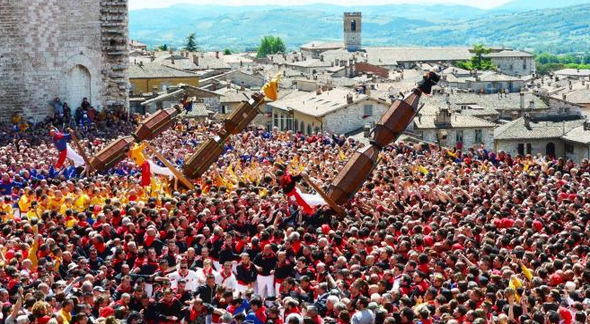
Comment (0)